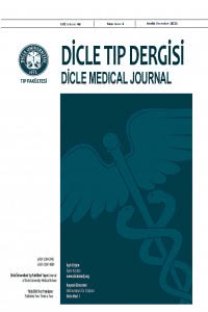Antikolinesteraz ilaçların sıçan ileum düz kasında betanekol ile uyarılan kasılma yanıtlarına etkisi
Günümüzde halen tedavi amaçlı olarak intestinal sistem ve mesane düz kaslarının atonisinde, glokomda, myastenia graviste ve kompetitif nöromuskuler kas gevşeticilerin etkilerinin sonlandırılmasında kullanılan antikolinesterazlar, bu gibi kolinerjik aktivitenin azaldığı durumlarda reseptörler üzerine selektif etkiler oluşturmaktan ziyade ACh konsantrasyonunu arttırarak dolaylı etkileriyle nonselektif olarak hem muskarinik hem de nikotinik etkiler oluştururlar. Son yıllarda yapılan bazı çalışmalarda antikolinesteraz ilaçların doğrudan antimuskarinik etkiler de oluşturabileceği bildirilmiştir. Biz de çalışmamızda bu amaçla, her bir Wistar albino sıçandan hazırlanan ileum düz kas preparatlarında muskarinik agonistik etkili betanekol ile oluşturulan kasılma yanıtları üzerine neostigmin, edrofonyum ve piridostigminin doza bağımlı etkilerini inceledik. Antikolinesterazların hiçbirisi ilk üç derişimlerinde betanekol kasılma yanıtlarında bir güçlenmeye yol açmadı (p > 0,05; eşleştirilmiş Student’s t test). Fakat 1000μM’lık en yüksek derişimlerinde, neostigmin, edrofonyum ve piridostigmin, ileum düz kas preparatlarında betanekol ile uyarılan düz kas kasılmalarını zayıflattı (p ≤ 0,05; paired samples t test). Sonuçlar antikolinesterazların sıçan ileum preparatlarındaki kolinerjik kasılma yanıtları üzerinde dual etkili olmadıklarını düşündürmektedir. Antikolinesterazlar yüksek dozlarında, ileum düz kas kasılmaları üzerinde antimuskarinik etkilere yol açabilirler.
Anahtar Kelimeler:
Sıçan, Wistar, Betanekol, Modeller, hayvan, Kolinesteraz inhibitörleri, Kas, düz, Kas kasılması, İleum
The effects of anticholinesterase drugs on bethanechol-induced contractile responses in rat ileum smooth muscle
At present, anticholinesterase drugs are valuable as therapeutic agents when cholinergic activity decreased in cases such as glokom, myastenia gravis and postoperative period which induces atony in bladder and intestinal smooth muscles. In these conditions anticholinesterases are expected to increase the levels of acetylcholine by inhibiting the enzyme acetylcholinesterase, thus they can exhibit both muscarinic and nicotinic effects indirectly rather than constituting a direct effect on muscarinic receptors. But recently, it has been shown that anticholinesterase drugs may exhibit a dose-dependent antimuscarinic effect by interacting with muscarinic receptors directly. According to these results, we investigated the dose-dependent effects of anticholinesterases on bethanechol-induced contractile responses at ileum smooth muscle preparations. Our results show that none of the three anticholinesterases did cause any potentialization on contractile responses for bethanechol at their first three concentrations (p > 0,05; paired samples t test). But at their highest concentration such as 1000 μM, neostigmine, edrophonium and piridostigmine attenuated the bethanechol induced contractile responses (p≤ 0,05; paired samples t test). These results suggest that anticholinesterases do not have dual effects on bethanechol induced contractile responses in rat ileum smooth muscle preparations. Larger doses of anticholinesterases may evoke antimuscarinic effects on ileum smooth muscle contractions.
Keywords:
Rats, Wistar, Bethanechol, Models, Animal, Cholinesterase Inhibitors, Muscle, Smooth, Muscle Contraction, Ileum,
___
- 1. Goodman Gilman A; Hardman JG, Limbird LE. Goodman & Gilman’s The Pharmacological Basis of Therapeutics. Ninth Edition, McGraw-Hill Medical Publishing Division; 1996; 105 - 106, 161-163, 171.
- 2. Katzung BG. Basic & Clinical Pharmacology. Cholinoceptor-activating & Cholinesterase-inhibiting drugs. Seventh Edition, McGraw-Hill Medical Publishing Division; 1998; 93-96.
- 3. Tsuda A, Shibata O, Saito M, et all. A dose-response study of anticholinesterase drugs on contractile and phosphatidylinositol responses of rat trachea. Anasthesia & Analgesia 2001; 92: 100-105.
- 4. Deschamps A, Backman SB, Novak V,et all. Effects of the anticholinesterase edrophonium on spectral analysis of heart rate and blood pressure variability in humans. J Pharmacol Exp Ther 2002; 300: 112-117.
- 5. Pharmacological Experiments on Isolated Preparations. Experiments with Intestinal Smooth Muscle. By the staff of the Department of Pharmacology, University of Edinburgh, Preface by PERRY W. L. M.,Churchill Livingstone, Edinburgh, London and New York; 1970; 58 – 62.
- 6. Koujirou Y, Yasufumi S, Tatsuji I:Pharmacodynamic analysis of cholinesterase inhibitors in rats. Journal of Pharmacokinetics and Biopharmaceutics 1996; 24: 327-347.
- 7. Kayaalp SO. Rasyonel tedavi yönünden Tıbbi Farmakoloji. Kolinomimetik ilaçlar:Parasempatomimetik ilaçlar ve antikolinesterazlar. Cilt II, sekizinci baskı, Ankara: Feryal Matbaacılık; 1998; 1136-1152.
- 8. Galligan JJ, Burks TF: Cholinergic neurons mediate intestinal propulsion in therat. The Journal of Pharmacology and Experimental Therapeutics 1986; 238: 594-598.
- 9. Endou M, Tanito Y, Okumura F: A comparison between chronotropic effects of neostigmine and edrophonium in isolated guinea-pig right atrium. Pharmacology and Exp. Therapeutics 1997; 282: 1480-1486.
- 10. Stengel PW, Cohen ML: M1 receptormediated nitric oxide-dependent relaxation unmasked in stomach fundus from M3 receptor knockout mice. J Pharmacol Exp Ther 2003;304: 675-682.
- 11. Olgart C, Iversen HH: Nitric oxidedependent relaxation induced by M1 muscarinic receptor activation in the rat small intestine. Br J Pharmacol 1999; 127: 309-313.
- 12. Shehnaz D, Ansari ZK, Ehlert FJ: Acetylcholine-induced desensitization of the contractile response to histamine in guinea-pig ileum is prevented by either pertusis toxin treatment or by selective inactivation of muscarinic M3 receptors. J Pharmacol Exp Ther 2001; 297: 1152-1159.
- 13. Eglen RM, Adham N, Whiting RL:Acute desensitization of muscarinic receptors in the isolated guinea-pig ileal longitudinal muscle. J Auton Pharmacol 1992; 12: 137-148.
- 14. Stengel PW, Gomeza J, Wess J, Cohen ML: M(2) and M(4) receptor knockout mice: muscarinic receptor function in cardiac and smooth muscle in vitro. J Pharmacol Exp Ther 2000; 292: 877-885.
- 15. Tanito Y, Miwa T, Endou M, et all.Interaction of edrophonium with muscarinic acetylcholine M2 and M3 receptors. Anesthesiology 2001; 94: 804-814.
- 16. Sherby SM, Eldefrawi AT,Albuquerque EX, Eldefrawi ME: Comparison of the actions of carbamate anticholinesterases on the nicotinic acetylcholine receptor. Mol Pharmacol 1985; 27: 343-348.
- 17. Yost CS, Maestrone E: Clinical concentrations of edrophonium enhance desensitization of the nicotinic acetylcholine receptor. Anesth Analg 1994; 78: 520-526.
- ISSN: 1300-2945
- Yayın Aralığı: Yılda 4 Sayı
- Başlangıç: 1963
- Yayıncı: Cahfer GÜLOĞLU
Sayıdaki Diğer Makaleler
Türkiye’nin Güneydoğusundaki akut zehirlenme olgularının profili
DAVUT AKIN, Yekta TÜZÜN, Timuçin ÇİL
Genetik amaçlı amniyosentez uygulanan 183 olgunun prospektif analizi
Tip 2 diyabetik hastalarda hepatosteatoz görülme sıklığı
Deniz GÖKALP, İlhan KILINÇ, DAVUT AKIN
Tüberküloz plörezili 128 olgunun değerlendirmesi
Levent AKYILDIZ, TEKİN YILDIZ, Güngör ATEŞ, Baran GÜNDOĞUŞ, Füsun TOPÇU
İki olgu nedeniyle mukormikozis
M. Faruk OKTAY, Müzeyyen YILDIRIM
Kanser tedavisinde biyotoksinler
Patoloji arşivindeki 10 yıllık kanser (1991-2000) olgularının genel değerlendirilmesi
Göbek kordonu kan ve stromal kökenli hücrelerin sinir hücrelerine farklılaşması
Özlem Pamukçu BARAN, YUSUF NERGİZ, SELEN BAHÇECİ
